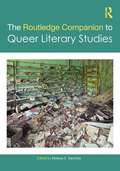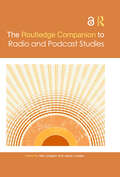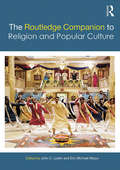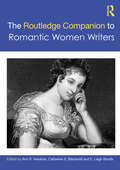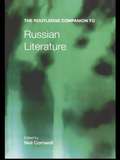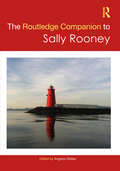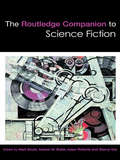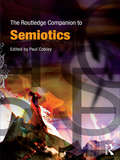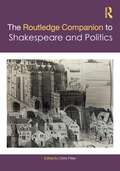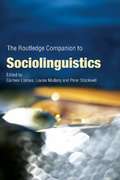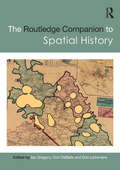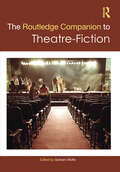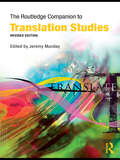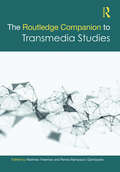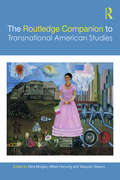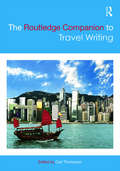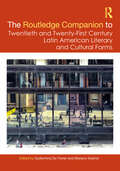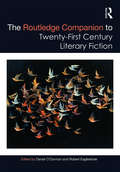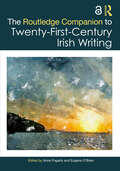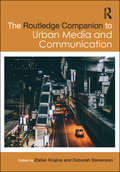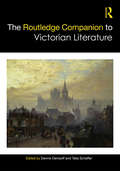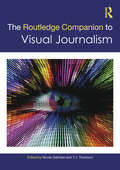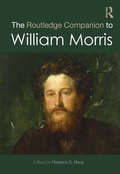- Table View
- List View
The Routledge Companion to Queer Literary Studies (Routledge Literature Companions)
by Melissa E. SanchezBringing together twenty-seven established and emerging scholars, The Routledge Companion to Queer Literary Studies discusses the historical development, current state, future directions, and political stakes of queer literary studies as a field of research and pedagogy.This innovative collection offers new frameworks for studying and teaching literature, art, film, music, theory, and philosophy from the medieval period to the twenty-first century. The contributors consider the structural implication of gender and sexuality with race, class, gender, ability, colonialism, capital, empire, ability, and relationships between human and non-human life and matter.The Routledge Companion to Queer Literary Studies is a vital resource for scholars, students, and teachers working across a range of historical periods, critical methods, and objects of study. It offers a multitude of approaches to queer literary studies, revealing the field to be as vital, and as contested, as ever.
The Routledge Companion to Radio and Podcast Studies (Routledge Media and Cultural Studies Companions)
by Mia LindgrenThis comprehensive companion is a much-needed reference source for the expanding field of radio, audio, and podcast study, taking readers through a diverse range of essays examining the core questions and key debates surrounding radio practices, technologies, industries, policies, resources, histories, and relationships with audiences. Drawing together original essays from well-established and emerging scholars to conceptualize this multidisciplinary field, this book’s global perspective acknowledges radio’s enduring affinity with the local, historical relationship to the national, and its unpredictably transnational reach. In its capacious understanding of what constitutes radio, this collection also recognizes the latent time-and-space shifting possibilities of radio broadcasting, and of the myriad ways for audio to come to us 'live.' Chapters on terrestrial radio mingle with studies of podcasts and streaming audio, emphasizing continuities and innovations in form and content, delivery and reception, production cultures and aesthetics, reminding us that neither 'radio' nor 'podcasting' should be approached as static objects of analysis but rather as mutually constituting cultural forms. This cutting-edge and vibrant companion provides a rich resource for scholars and students of history, art theory, industry studies, journalism, media and communication, cultural studies, feminist analysis, and postcolonial studies.
The Routledge Companion to Religion and Popular Culture (Routledge Religion Companions)
by John C. Lyden Eric Michael MazurReligion and popular culture is a fast-growing field that spans a variety of disciplines. This volume offers the first real survey of the field to date and provides a guide for the work of future scholars. It explores: key issues of definition and of methodology religious encounters with popular culture across media, material culture and space, ranging from videogames and social networks to cooking and kitsch, architecture and national monuments representations of religious traditions in the media and popular culture, including important non-Western spheres such as Bollywood This Companion will serve as an enjoyable and informative resource for students and a stimulus to future scholarly work.
The Routledge Companion to Romantic Women Writers (Routledge Literature Companions)
by Ann R. Hawkins, Catherine S. Blackwell, and E. Leigh BondsThe Routledge Companion to Romantic Women Writers overviews critical reception for Romantic women writers from their earliest periodical reviews through the most current scholarship and directs users to avenues of future research. It is divided into two parts.The first section offers topical discussions on the status of provincial poets, on women’s engagement in children’s literature, the relation of women writers to their religious backgrounds, the historical backgrounds to women’s orientalism, and their engagement in debates on slavery and abolition.The second part surveys the life and careers of individual women – some 47 in all with sections for biography, biographical resources, works, modern editions, archival holdings, critical reception, and avenues for further research. The final sections of each essay offer further guidance for researchers, including “Signatures” under which the author published, and a “List of Works” accompanied, whenever possible, with contemporary prices and publishing formats. To facilitate research, a robust “Works Cited” includes all texts mentioned or quoted in the essay.
The Routledge Companion to Russian Literature (Routledge Companions)
by Neil CornwellThe Routledge Companion to Russian Literature is an engaging and accessible guide to Russian writing of the past thousand years. The volume covers the entire span of Russian literature, from the Middle Ages to the post-Soviet period, and explores all the forms that have made it so famous: poetry, drama and, of course, the Russian novel. A particular emphasis is given to the nineteenth and twentieth centuries, when Russian literature achieved world-wide recognition through the works of writers such as Pushkin, Dostoevsky, Tolstoy, Chekhov, Nabokov and Solzhenitsyn. Covering a range of subjects including women's writing, Russian literary theory, socialist realism and émigré writing, leading international scholars open up the wonderful diversity of Russian literature. With recommended lists of further reading and an excellent up-to-date general bibliography, The Routledge Companion to Russian Literature is the perfect guide for students and general readers alike.
The Routledge Companion to Sally Rooney (Routledge Literature Companions)
by Angelos BollasThe Routledge Companion to Sally Rooney offers an in-depth examination of one of the most influential contemporary Irish authors, Sally Rooney, offering valuable insights into her writing and its socio-cultural significance.This comprehensive collection brings together contributions from international scholars who explore Rooney’s novels through a range of interdisciplinary lenses, including literary studies, gender theory, political analysis, and cultural criticism. The book provides critical insights into Rooney’s exploration of millennial identity, class dynamics, relationships, and the evolving role of technology in shaping human connections. By situating Rooney’s work within both the global context and post-Celtic Tiger Ireland, the collection presents a nuanced understanding of her literary impact.The Routledge Companion to Sally Rooney is essential reading for academics and students studying contemporary Irish literature. The volume not only highlights the significance of Rooney’s work in contemporary literature but also expands on its sociopolitical relevance, making it an indispensable resource for understanding her cultural impact.
The Routledge Companion to Science Fiction (Routledge Literature Companions)
by Mark BouldThe Routledge Companion to Science Fiction is a comprehensive overview of the history and study of science fiction. It outlines major writers, movements, and texts in the genre, established critical approaches and areas for future study. Fifty-six entries by a team of renowned international contributors are divided into four parts which look, in turn, at: history – an integrated chronological narrative of the genre’s development theory – detailed accounts of major theoretical approaches including feminism, Marxism, psychoanalysis, cultural studies, postcolonialism, posthumanism and utopian studies issues and challenges – anticipates future directions for study in areas as diverse as science studies, music, design, environmentalism, ethics and alterity subgenres – a prismatic view of the genre, tracing themes and developments within specific subgenres. Bringing into dialogue the many perspectives on the genre The Routledge Companion to Science Fiction is essential reading for anyone interested in the history and the future of science fiction and the way it is taught and studied.
The Routledge Companion to Semiotics (Routledge Companions)
by Paul CobleyThe Routledge Companion to Semiotics provides the ideal introduction to semiotics, containing engaging essays from an impressive range of international leaders in the field. Topics covered include: the history, development, and uses of semiotics key theorists, including Saussure, Peirce and Sebeok crucial and contemporary topics such as biosemiotics, sociosemiotics and semioethics the semiotics of media and culture, nature and cognition. Featuring an extended glossary of key terms and thinkers as well as suggestions for further reading, this is an invaluable reference guide for students of semiotics at all levels.
The Routledge Companion to Shakespeare and Politics (Routledge Literature Companions)
by Chris FitterThe Routledge Companion to Shakespeare and Politics challenges and transforms our understanding of the politics of Shakespeare’s plays. Through up-to-date essays by historians, biographers, and Shakespeare critics, this Companion offers, first, a systematic examination of dominant institutions and emergent thought in Shakespeare’s society, then meditation on Shakespeare’s representation of these.Contributors consider the common law and the legally embattled royal prerogative, the functioning of the justice system, the impact of angry Tudor reformers, early capitalism, war, libels, rebellion, populism, religion, and cosmological ferment, as well as the class system, Machiavelli, Montaigne, and theatrical transgression. Opening chapters discuss the harsh politicisation of childhood Shakespeare, the subversive practices built into grammar school education, and the mythic retirement of Shakespeare to an idyllic Warwickshire. Combining social panorama with sharp critical readings, this synoptic approach allows identification of a political coherence to Shakespeare’s drama: identifying commonalities of vision, frequently critical and dissident, returning in different plays. The final section looks at Shakespeare’s reception within Marxism, feminism, racial theory, LGBTQ+ thought, and ecocriticism.The collection recovers a lost Shakespeare, of substantial political disaffection in very dark times, offering a challenging political redirection of Shakespeare studies, and perhaps a Shakespeare for our era. As an authoritative, state-of-the-art guide to this resonant topic, it will be of interest to anyone researching or studying Shakespeare.
The Routledge Companion to Sociolinguistics (Routledge Companions)
by Peter Stockwell Carmen Llamas Louise MullanyHave you ever noticed an accent or puzzled over a dialect phrase? Language can be a powerful tool with which one can create a persona; it can be a common ground between people or can be used as a divide between social groups. This Companion is for anyone who is interested in how and why people speak and write with such diversity. The Routledge Companion to Sociolinguistics includes articles by leading scholars in the field on: methods of observation and analysis social correlates socio-psychological factors socio-political factors language change. With a substantial A-Z glossary of key terms and concepts, directions for further study, and detailed cross-referencing with links to the glossary, The Routledge Companion to Sociolinguistics is both an essential broad-based introduction for those new to the field, and a highly useful reference for the more advanced linguist.
The Routledge Companion to Spatial History (Routledge Companions)
by Ian Gregory, Don DeBats, and Don LafreniereThe Routledge Companion to Spatial History explores the full range of ways in which GIS can be used to study the past, considering key questions such as what types of new knowledge can be developed solely as a consequence of using GIS and how effective GIS can be for different types of research. Global in scope and covering a broad range of subjects, the chapters in this volume discuss ways of turning sources into a GIS database, methods of analysing these databases, methods of visualising the results of the analyses, and approaches to interpreting analyses and visualisations. Chapter authors draw from a diverse collection of case studies from around the world, covering topics from state power in imperial China to the urban property market in nineteenth-century Rio de Janeiro, health and society in twentieth-century Britain and the demographic impact of the Second Battle of Ypres in 1915. Critically evaluating both the strengths and limitations of GIS and illustrated with over two hundred maps and figures, this volume is an essential resource for all students and scholars interested in the use of GIS and spatial analysis as a method of historical research.
The Routledge Companion to Theatre-Fiction (Routledge Literature Handbooks)
by Graham WolfeNovelists have long been attracted to theatre. Some have pursued success on the stage, but many have sought to combine these worlds, entering theatre through their fiction, setting stages on their novels’ pages, and casting actors, directors, and playwrights as their protagonists. The Routledge Companion to Theatre-Fiction has convened an international community of scholars to explore the remarkable array of novelists from many eras and parts of the world who have created fiction from the stuff of theatre, asking what happens to theatre on the pages of novels, and what happens to novels when they collaborate with theatre. From J. W. Goethe to Louisa May Alcott, Mikhail Bulgakov, Virginia Woolf, and Margaret Atwood, some of history’s most influential novelists have written theatre-fiction, and this Companion discusses many of these figures from new angles. But it also spotlights writers who have received less critical attention, such as Dorothy Leighton, Agustín de Rojas Villandrando, Ronald Firbank, Syed Mustafa Siraj, Li Yu, and Vicente Blasco Ibañez, bringing their work into conversation with a vital field. A valuable resource for students, scholars, and admirers of both theatre and novels, The Routledge Companion to Theatre-Fiction offers a wealth of new perspectives on topics of increasing critical concern, including intermediality, theatricality, antitheatricality, mimesis, diegesis, and performativity.
The Routledge Companion to Theatre-Fiction (Routledge Literature Handbooks)
by Graham WolfeNovelists have long been attracted to theatre. Some have pursued success on the stage, but many have sought to combine these worlds, entering theatre through their fiction, setting stages on their novels’ pages, and casting actors, directors, and playwrights as their protagonists. The Routledge Companion to Theatre-Fiction has convened an international community of scholars to explore the remarkable array of novelists from many eras and parts of the world who have created fiction from the stuff of theatre, asking what happens to theatre on the pages of novels, and what happens to novels when they collaborate with theatre. From J. W. Goethe to Louisa May Alcott, Mikhail Bulgakov, Virginia Woolf, and Margaret Atwood, some of history’s most influential novelists have written theatre-fiction, and this Companion discusses many of these figures from new angles. But it also spotlights writers who have received less critical attention, such as Dorothy Leighton, Agustín de Rojas Villandrando, Ronald Firbank, Syed Mustafa Siraj, Li Yu, and Vicente Blasco Ibañez, bringing their work into conversation with a vital field. A valuable resource for students, scholars, and admirers of both theatre and novels, The Routledge Companion to Theatre-Fiction offers a wealth of new perspectives on topics of increasing critical concern, including intermediality, theatricality, antitheatricality, mimesis, diegesis, and performativity.
The Routledge Companion to Translation Studies (Routledge Companions)
by Jeremy MundayThe Routledge Companion to Translation Studies brings together clear, detailed essays from leading international scholars on major areas in Translation Studies today. This accessible and authoritative guide offers fresh perspectives on linguistics, context, culture, politics and ethics and contains a range of contributions on emerging areas such as cognitive theories, technology, interpreting and audiovisual translation. Supported by an extensive glossary of key concepts and a substantial bibliography, this Companion is an essential resource for undergraduates, postgraduates, researchers and professionals working in this exciting field of study. Jeremy Munday is Senior Lecturer in Spanish and Translation Studies at the University of Leeds. He is the author of Introducing Translation Studies, Translation: An Advanced Resource Book (with Basil Hatim) and Style and Ideology in Translation, all published by Routledge. "An excellent all-round guide to translation studies taking in the more traditional genres and those on the cutting edge. All the contributors are known experts in their chosen areas and this gives the volume the air of authority required when dealing with a subject that is being increasingly studied in higher education institutions all over the world" - Christopher Taylor, University of Trieste, Italy
The Routledge Companion to Transmedia Studies (Routledge Media and Cultural Studies Companions)
by Matthew Freeman Renira Rampazzo GambaratoAround the globe, people now engage with media content across multiple platforms, following stories, characters, worlds, brands and other information across a spectrum of media channels. This transmedia phenomenon has led to the burgeoning of transmedia studies in media, cultural studies and communication departments across the academy. The Routledge Companion to Transmedia Studies is the definitive volume for scholars and students interested in comprehending all the various aspects of transmediality. This collection, which gathers together original articles by a global roster of contributors from a variety of disciplines, sets out to contextualize, problematize and scrutinize the current status and future directions of transmediality, exploring the industries, arts, practices, cultures, and methodologies of studying convergent media across multiple platforms.
The Routledge Companion to Transnational American Studies (Routledge Literature Companions)
by Takayuki Tatsumi Nina Morgan Alfred HornungThe Routledge Companion to Transnational American Studies provides scholars and students of American Studies with theoretical and applied essays that help to define Transnational American Studies as a discipline and practice. In more than 30 essays, the volume offers a history of the concept of the "transnational" and takes readers from the Barbary frontier to Guam, from Mexico's border crossings to the intifada's contested zones. Together, the essays develop new ways for Americanists to read events, images, sound, literature, identity, film, politics, or performance transnationally through the work of diverse figures, such as Confucius, Edward Said, Pauline Hopkins, Poe, Faulkner, Michael Jackson, Onoto Watanna, and others. This timely volume also addresses presidential politics and interpictorial US history from Lincoln in Africa, to Obama and Mandela, to Trump. The essays, written by prominent global Americanists, as well as the emerging scholars shaping the field, seek to provide foundational resources as well as experimental and forward-leaning approaches to Transnational American Studies.
The Routledge Companion to Travel Writing (Routledge Literature Companions)
by Carl ThompsonAs many places around the world confront issues of globalization, migration and postcoloniality, travel writing has become a serious genre of study, reflecting some of the greatest concerns of our time. Encompassing forms as diverse as field journals, investigative reports, guidebooks, memoirs, comic sketches and lyrical reveries; travel writing is now a crucial focus for discussion across many subjects within the humanities and social sciences. An ideal starting point for beginners, but also offering new perspectives for those familiar with the field, The Routledge Companion to Travel Writing examines: Key debates within the field, including postcolonial studies, gender, sexuality and visual culture Historical and cultural contexts, tracing the evolution of travel writing across time and over cultures Different styles, modes and themes of travel writing, from pilgrimage to tourism Imagined geographies, and the relationship between travel writing and the social, ideological and occasionally fictional constructs through which we view the different regions of the world. Covering all of the major topics and debates, this is an essential overview of the field, which will also encourage new and exciting directions for study. Contributors: Simon Bainbridge, Anthony Bale, Shobhana Bhattacharji, Dúnlaith Bird, Elizabeth A. Bohls, Wendy Bracewell, Kylie Cardell, Daniel Carey, Janice Cavell, Simon Cooke, Matthew Day, Kate Douglas, Justin D. Edwards, David Farley, Charles Forsdick, Corinne Fowler, Laura E. Franey, Rune Graulund, Justine Greenwood, James M. Hargett, Jennifer Hayward, Eva Johanna Holmberg, Graham Huggan, William Hutton, Robin Jarvis, Tabish Khair, Zoë Kinsley, Barbara Korte, Julia Kuehn, Scott Laderman, Claire Lindsay, Churnjeet Mahn, Nabil Matar, Steve Mentz, Laura Nenzi, Aedín Ní Loingsigh, Manfred Pfister, Susan L. Roberson, Paul Smethurst, Carl Thompson, C.W. Thompson, Margaret Topping, Richard White, Gregory Woods.
The Routledge Companion to Twentieth and Twenty-First Century Latin American Literary and Cultural Forms (Routledge Companions to Hispanic and Latin American Studies)
by Guillermina De Ferrari Mariano SiskindThe Routledge Companion to Twentieth and Twenty-First Century Latin American Literary and Cultural Forms brings together a team of expert contributors in this critical and innovative volume. Highlighting key trends within the discipline, as well as cutting-edge viewpoints that revise and redefine traditional debates and approaches, readers will come away with an understanding of the complexity of twenty-first-century Latin American cultural production and with a renovated and eminently contemporary understanding of twentieth-century literature and culture. This invaluable resource will be of interest to advanced students and academics in the fields of Latin American literature, cultural studies, and comparative literature.
The Routledge Companion to Twenty-First Century Literary Fiction (Routledge Literature Companions)
by Robert Eaglestone Daniel O'GormanThe study of contemporary fiction is a fascinating yet challenging one. Contemporary fiction has immediate relevance to popular culture, the news, scholarly organizations, and education – where it is found on the syllabus in schools and universities – but it also offers challenges. What is ‘contemporary’? How do we track cultural shifts and changes? The Routledge Companion to Twenty-First Century Literary Fiction takes on this challenge, mapping key literary trends from the year 2000 onwards, as the landscape of our century continues to take shape around us. A significant and central intervention into contemporary literature, this Companion offers essential coverage of writers who have risen to prominence since then, such as Hari Kunzru, Jennifer Egan, David Mitchell, Jonathan Lethem, Ali Smith, A. L. Kennedy, Hilary Mantel, Marilynne Robinson, and Colson Whitehead. Thirty-eight essays by leading and emerging international scholars cover topics such as: • Identity, including race, sexuality, class, and religion in the twenty-first century; • The impact of technology, terrorism, activism, and the global economy on the modern world and modern literature; • The form and format of twenty-first century literary fiction, including analysis of established genres such as the pastoral, graphic novels, and comedic writing, and how these have been adapted in recent years. Accessible to experts, students, and general readers, The Routledge Companion to Twenty-First Century Literary Fiction provides a map of the critical issues central to the discipline, as well as uncovering new perspectives and new directions for the development of the field. It is essential reading for anyone interested in the past, present, and future of contemporary literature.
The Routledge Companion to Twenty-First-Century Irish Writing (Routledge Literature Companions)
by Anne Fogarty and Eugene O’BrienThis Companion brings together leading scholars in the field of Irish studies to explore the significance of twenty-first-century Irish writing and its flourishing popularity worldwide. Focusing on Irish writing published or performed in the twenty-first century, this volume explores genres, modes and styles of writing that are current, relevant and distinctive in today’s classrooms. Examining a host of innovative, key writers, including Sally Rooney, Marion Keyes, Sebastian Barry, Paul Howard, Claire Kilroy, Micheal O’Siadhail, Donal Ryan, Marina Carr, Enda Walsh, Martin McDonagh, Colette Bryce, Leanne Quinn, Sinéad Morrissey, Paula Meehan, Ailbhe Ní Ghearbhuigh and Doireann Ni Ghríofa. This text investigates the sociocultural and theoretical contexts of their aesthetic achievements and innovations. Furthermore, The Routledge Companion to Twenty-First-Century Irish Writing traces the expansion of Irish writing, offering fresh insight to Irish identities across the boundaries of race, class and gender. With its distinctive contemporary focus and comprehensive scope, this multifaceted volume provides the first significant literary history of twenty-first-century Irish literature.
The Routledge Companion to Urban Media and Communication
by Deborah Stevenson Zlatan KrajinaThe Routledge Companion to Urban Media and Communication traces central debates within the burgeoning interdisciplinary research on mediated cities and urban communication. The volume brings together diverse perspectives and global case studies to map key areas of research within media, cultural and urban studies, where a joint focus on communications and cities has made important innovations in how we understand urban space, technology, identity and community. Exploring the rise and growing complexity of urban media and communication as the next key theme for both urban and media studies, the book gathers and reviews fast-developing knowledge on specific emergent phenomena such as: reading the city as symbol and text; understanding urban infrastructures as media (and vice-versa); the rise of global cities; urban and suburban media cultures: newspapers, cinema, radio, television and the mobile phone; changing spaces and practices of urban consumption; the mediation of the neighbourhood, community and diaspora; the centrality of culture to urban regeneration; communicative responses to urban crises such as racism, poverty and pollution; the role of street art in the negotiation of ‘the right to the city’; city competition and urban branding; outdoor advertising; moving image architecture; ‘smart’/cyber urbanism; the emergence of Media City production spaces and clusters. Charting key debates and neglected connections between cities and media, this book challenges what we know about contemporary urban living and introduces innovative frameworks for understanding cities, media and their futures. As such, it will be an essential resource for students and scholars of media and communication studies, urban communication, urban sociology, urban planning and design, architecture, visual cultures, urban geography, art history, politics, cultural studies, anthropology and cultural policy studies, as well as those working with governmental agencies, cultural foundations and institutes, and policy think tanks.
The Routledge Companion to Victorian Literature (Routledge Literature Companions)
by Dennis Denisoff Talia SchafferThe Routledge Companion to Victorian Literature offers 45 chapters by leading international scholars working with the most dynamic and influential political, cultural, and theoretical issues addressing Victorian literature today. Scholars and students will find this collection both useful and inspiring. Rigorously engaged with current scholarship that is both historically sensitive and theoretically informed, the Routledge Companion places the genres of the novel, poetry, and drama and issues of gender, social class, and race in conversation with subjects like ecology, colonialism, the Gothic, digital humanities, sexualities, disability, material culture, and animal studies. This guide is aimed at scholars who want to know the most significant critical approaches in Victorian studies, often written by the very scholars who helped found those fields. It addresses major theoretical movements such as narrative theory, formalism, historicism, and economic theory, as well as Victorian models of subjects such as anthropology, cognitive science, and religion. With its lists of key works, rich cross-referencing, extensive bibliographies, and explications of scholarly trajectories, the book is a crucial resource for graduate students and advanced undergraduates, while offering invaluable support to more seasoned scholars.
The Routledge Companion to Visual Journalism (Routledge Journalism Companions)
by T. J. Thomson Nicole DahmenRepresenting the first collection of its kind, The Routledge Companion to Visual Journalism introduces fundamental topics and ideas, delineates the diversity and complexity of this growing field, and creates a foundation for future scholarship and study.In the contemporary digital media landscape, still and moving images, interactive visualizations and virtual reality are increasingly important to attract attention, cultivate engagement, inform and influence opinions, and provide a more emotive and immediate viewing experience for news audiences. This Companion draws together leading voices from academia and industry to survey this dynamic and ubiquitous mode and inspire dialogue. Along with an introduction and conclusion, the volume is structured in five sections and covers people and identities; practices and processes; technologies, equipment, and forms; theories, concepts, and values; and audience interpretation and impact. Beginning by looking at the history of visual news, chapters go on to explore how visual news is created; how journalists visually represent gender, race, sexuality, (dis)ability, "elites," and ordinary citizens; key ethical ideas and theories behind the creation of visual news; and how visual news is processed, drawing in research from eye-tracking, media psychology, and media literacy. The book ends with a critical look at the future of the field.The Routledge Companion to Visual Journalism is a recommended resource for all advanced students and researchers of visual journalism and communication and will also be of interest to practitioners in these fields.
The Routledge Companion to William Morris (Routledge Art History and Visual Studies Companions)
by Florence S. BoosWilliam Morris (1834–96) was an English poet, decorative artist, translator, romance writer, book designer, preservationist, socialist theorist, and political activist, whose admirers have been drawn to the sheer intensity of his artistic endeavors and efforts to live up to radical ideals of social justice. This Companion draws together historical and critical responses to the impressive range of Morris’s multi-faceted life and activities: his homes, travels, family, business practices, decorative artwork, poetry, fantasy romances, translations, political activism, eco-socialism, and book collecting and design. Each chapter provides valuable historical and literary background information, reviews relevant opinions on its subject from the late-nineteenth century to the present, and offers new approaches to important aspects of its topic. Morris’s eclectic methodology and the perennial relevance of his insights and practice make this an essential handbook for those interested in art history, poetry, translation, literature, book design, environmentalism, political activism, and Victorian and utopian studies.
The Routledge Companion to William Morris (Routledge Art History and Visual Studies Companions)
by Florence S. BoosWilliam Morris (1834–96) was an English poet, decorative artist, translator, romance writer, book designer, preservationist, socialist theorist, and political activist, whose admirers have been drawn to the sheer intensity of his artistic endeavors and efforts to live up to radical ideals of social justice. This Companion draws together historical and critical responses to the impressive range of Morris’s multi-faceted life and activities: his homes, travels, family, business practices, decorative artwork, poetry, fantasy romances, translations, political activism, eco-socialism, and book collecting and design. Each chapter provides valuable historical and literary background information, reviews relevant opinions on its subject from the late-nineteenth century to the present, and offers new approaches to important aspects of its topic. Morris’s eclectic methodology and the perennial relevance of his insights and practice make this an essential handbook for those interested in art history, poetry, translation, literature, book design, environmentalism, political activism, and Victorian and utopian studies.
